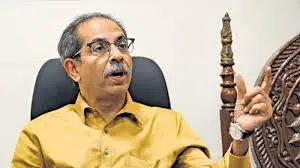Will BMC polls be the perfect storm for Uddhav Thackeray’s tottering Sena?

The upcoming Brihanmumbai Municipal Corporation (BMC) elections are shaping up to be a critical battleground for Maharashtra’s political heavyweights, with the Shiv Sena, led by Uddhav Thackeray, standing at a precarious crossroads. Once the undisputed powerhouse in Mumbai politics, the party now faces challenges that threaten to unravel its influence, making these polls potentially the perfect storm for Uddhav Thackeray’s tottering Sena.
Shiv Sena’s Decline: From Dominance to Dilemma
The Shiv Sena, under the charismatic leadership of Balasaheb Thackeray, had a long-standing grip on Mumbai’s political landscape. However, after Balasaheb’s demise, the party saw internal fissures deepen, culminating in a bitter split between Uddhav Thackeray and his cousin, Eknath Shinde. The rebellion led by Shinde, who garnered the support of a significant number of Sena MLAs, has considerably weakened Uddhav’s faction.
This division not only dented the party’s public image but also its organizational strength, especially in Mumbai, where the BMC polls hold immense significance. The fractured Sena risks alienating its core voter base, traditionally loyal to the party’s Hindutva ideology and regional pride.
The Stakes in BMC Elections
BMC, being Asia’s richest municipal corporation, is a prize every political party covets. Control over Mumbai’s civic administration means influence over development projects, infrastructure, and, importantly, the vast machinery that translates into electoral votes.
For Uddhav Thackeray’s faction, the BMC polls are not just about seats but survival. A poor performance could validate the narrative of Sena’s decline and embolden rivals. It also threatens to erode the Sena’s position as a kingmaker in Maharashtra politics.
Opposition and Emerging Challenges
The BJP, once an ally, is now a formidable adversary seeking to consolidate power in Mumbai. With Eknath Shinde aligning with the BJP, Uddhav’s Sena faces competition from both fronts—BJP on one side and the Shinde faction on the other. Meanwhile, parties like the Congress and NCP are also eager to exploit the Sena’s weakness and make inroads in Mumbai’s civic governance.
Furthermore, voter sentiment in Mumbai is shifting, with many citizens demanding better civic services, transparency, and development, rather than just ideological posturing. The Sena’s internal turmoil might cast doubts on its ability to deliver on these fronts.
Can Uddhav Sena Weather the Storm?
Despite the challenges, Uddhav Thackeray’s faction retains loyal pockets of support, especially among traditional Sena voters disillusioned by the rebellion. The party’s leadership will need to mount a robust campaign focusing on governance, local issues, and reconnecting with grassroots workers.
Moreover, Uddhav’s image as a more moderate and pragmatic leader compared to his predecessor could help the party appeal to a broader electorate. However, the fragmented nature of the Sena and the intensified competition make the road ahead arduous.
Conclusion: The Perfect Storm or a Turning Point?
The BMC elections might well be the perfect storm for Uddhav Thackeray’s tottering Sena, testing its resilience and relevance in Mumbai politics. The outcome could either hasten the party’s decline or serve as a crucial turning point for rebuilding and regaining lost ground.
For now, all eyes remain on Mumbai as the political drama unfolds, with the BMC polls set to redefine the future of one of Maharashtra’s oldest political outfits.






